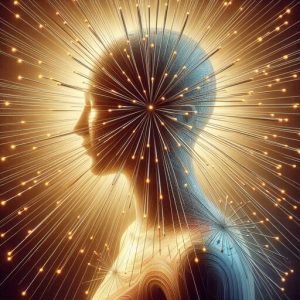Bridging Ancient Wisdom with Modern Healthcare
Acupuncture, a therapeutic technique rooted in Traditional Chinese Medicine (TCM), involves the insertion of tiny needles into specific points on the body. With origins dating back over 2,000 years, acupuncture aims to restore balance and harmony within the body’s vital energy, known as Qi. Today, acupuncture is gaining recognition and acceptance as an alternative therapy modality, reflecting a shift towards integrative approaches to healthcare.
Perspectives on Acupuncture’s Mechanisms
Acupuncture is viewed through two main perspectives: Traditional Chinese Medicine (TCM) and Western medicine. While TCM focuses on rebalancing Qi flow along meridians, Western medicine explores acupuncture’s physiological effects on nerve stimulation and pain modulation.
Traditional Chinese Medicine (TCM) Perspective
 In TCM, Qi is the vital energy that flows through meridians, influencing overall health. Acupuncture needles stimulate specific points to restore Qi flow and promote well-being. Meridians, conceptual pathways through which Qi flows, connect various organs and systems in the body. The smooth flow of Qi along these meridians is essential for maintaining health, while disruptions or blockages can lead to illness or discomfort. Acupuncture aims to regulate Qi flow by inserting needles into specific points along the meridians, promoting balance and harmony within the body.
In TCM, Qi is the vital energy that flows through meridians, influencing overall health. Acupuncture needles stimulate specific points to restore Qi flow and promote well-being. Meridians, conceptual pathways through which Qi flows, connect various organs and systems in the body. The smooth flow of Qi along these meridians is essential for maintaining health, while disruptions or blockages can lead to illness or discomfort. Acupuncture aims to regulate Qi flow by inserting needles into specific points along the meridians, promoting balance and harmony within the body.
Stimulating Qi Flow with Acupuncture Needles
Acupuncture needles are strategically inserted to stimulate Qi flow along meridians, promoting healing and restoring balance. The insertion of acupuncture needles is believed to stimulate sensory nerves, triggering a cascade of physiological responses. This includes the release of neurotransmitters and endorphins, which have analgesic and mood-regulating effects. Additionally, acupuncture needles may induce microtraumas in surrounding tissues, prompting the body’s natural healing response and enhancing circulation.
Potential Benefits of Acupuncture
Acupuncture offers diverse benefits, including pain relief, improved mood, enhanced immune function, and stress reduction. Research suggests that acupuncture may be effective in managing various conditions, including chronic pain, musculoskeletal disorders, migraines, anxiety, and depression. Many individuals report feeling relaxed and rejuvenated after acupuncture sessions, with improvements in both physical and emotional well-being.
Western Medicine Perspective
Scientific research supports acupuncture’s ability to modulate pain perception and induce the release of natural pain-relieving substances. According to Western medicine, acupuncture works by stimulating nerves, muscles, and connective tissues, leading to changes in neurotransmitter levels and pain signaling pathways. Studies have shown that acupuncture can be effective in reducing pain intensity and improving functional outcomes in conditions such as lower back pain, osteoarthritis, and fibromyalgia.
Research and Evidence
Numerous studies have demonstrated acupuncture’s effectiveness for various conditions, although ongoing research is needed to understand its mechanisms fully. Meta-analyses and systematic reviews have found acupuncture to be beneficial for pain management, nausea and vomiting associated with chemotherapy, insomnia, and menopausal symptoms. While some studies suggest that acupuncture may work by modulating the body’s neuroendocrine system, others emphasize its effects on local tissue responses and nerve signaling pathways.
What to Expect During an Acupuncture Session
Acupuncture sessions take place in a tranquil environment, with patients experiencing minimal discomfort during needle insertion. Various acupuncture techniques may be used to personalize treatment, including manual acupuncture, electroacupuncture, and auricular acupuncture. Patients can expect to feel relaxed and rejuvenated after an acupuncture session, with potential improvements in pain, mood, and overall well-being.
Additional Considerations: Safety and Qualifications
While acupuncture is generally safe, potential side effects such as minor bleeding or bruising may occur. Consulting a qualified acupuncturist is essential to ensure safe and effective treatment. Licensed acupuncturists undergo extensive training and certification to practice legally, ensuring proficiency in acupuncture techniques, anatomy, and safety procedures. Patients should also discuss any pre-existing medical conditions or medications with their acupuncturist before starting treatment to minimize the risk of adverse effects.
The FULL Article How Does Acupuncture Work? appeared first on MCR Therapies.
The Article How Does Acupuncture Work? Was Found On https://limitsofstrategy.com


Your exploration of acupuncture beautifully highlights the synergy between ancient practices and contemporary healthcare. It’s fascinating to consider how these two perspectives—TCM’s holistic understanding of Qi and Western medicine’s focus on physiological mechanisms—can coexist and complement each other.
I find it so interesting how acupuncture exemplifies this blend of ancient wisdom and modern science. The concept of Qi in Traditional Chinese Medicine really invites us to think about the balance of energy within our bodies, which can feel almost poetic when juxtaposed with the more reductionist approaches of Western medicine.
You’re spot on with that observation about acupuncture! It’s like this beautiful dance between the ancient and the modern. I mean, when you think about it, having tiny needles strategically placed on our bodies feels like we’re merging the wisdom of Confucius with the latest neuroscientific findings. Who knew being pricked could be so philosophical?
I really appreciate your thoughts on the synergy between ancient practices and contemporary healthcare. It’s an intriguing idea that these two perspectives can not only coexist but might actually enhance one another.
I agree, the idea that ancient practices and contemporary healthcare can enhance one another is quite fascinating. It seems like there’s so much to learn from those age-old traditions, especially when they emphasize a holistic approach to wellness.
Your insights on the intersection of ancient wisdom and modern healthcare are compelling; if you’re interested in enhancing recovery, I recently came across some valuable dietary strategies that might further bridge those perspectives.
‘Muscle Recovery: The Optimal Diet You Need to Follow’
https://lvabj.org/muscle-recovery-the-optimal-diet-you-need-to-follow/.
I appreciate you highlighting the synergy between ancient practices and contemporary healthcare. It’s fascinating to think about how these two realms can enhance one another. In many ways, the holistic approaches found in ancient traditions often emphasize the importance of a balanced lifestyle—something that modern healthcare sometimes overlooks in its focus on more symptom-driven treatment.
It’s interesting to think about how much we can learn from ancient practices as we navigate the complexities of modern healthcare. The holistic approaches you mentioned really emphasize balance and well-being, which feels especially relevant today, given how stress and fast-paced lifestyles can take a toll on our health.
You’re spot on about that balance. It’s interesting how so many ancient practices focus on the whole person—mind, body, and spirit—while modern medicine often zooms in on individual symptoms. The connection between lifestyle choices and health outcomes can sometimes get lost in the shuffle of quick fixes and prescriptions.
It’s great to hear you found the connection between ancient practices and modern healthcare intriguing. The idea that they can enhance each other really opens up possibilities for a more holistic approach to well-being.
It’s really cool to see that connection between ancient and modern practices resonate with you. Acupuncture does have this unique way of tapping into that ancient wisdom while fitting into the more scientific framework we’re used to today.
It’s intriguing to think about how acupuncture serves as a bridge between the ancient and modern worlds of medicine. The concept of Qi, or life energy, really emphasizes a perspective that often gets overlooked in Western medicine, which tends to focus strictly on the physical and measurable. It’s like seeing the body not just as a set of parts but as a much more intricate whole, where emotional and physical health are intertwined.
It’s great to see how you appreciate the interplay between traditional Chinese medicine (TCM) and contemporary healthcare. This relationship not only opens doors for innovative treatment approaches but also challenges us to think more broadly about health and wellness.